
IDAHOBIT – International Day Against Homophobia, Transphobia and Biphobia
About the day The International Day Against Homophobia, Transphobia and Biphobia is observed annually on May 17th. This day was created to raise awareness and
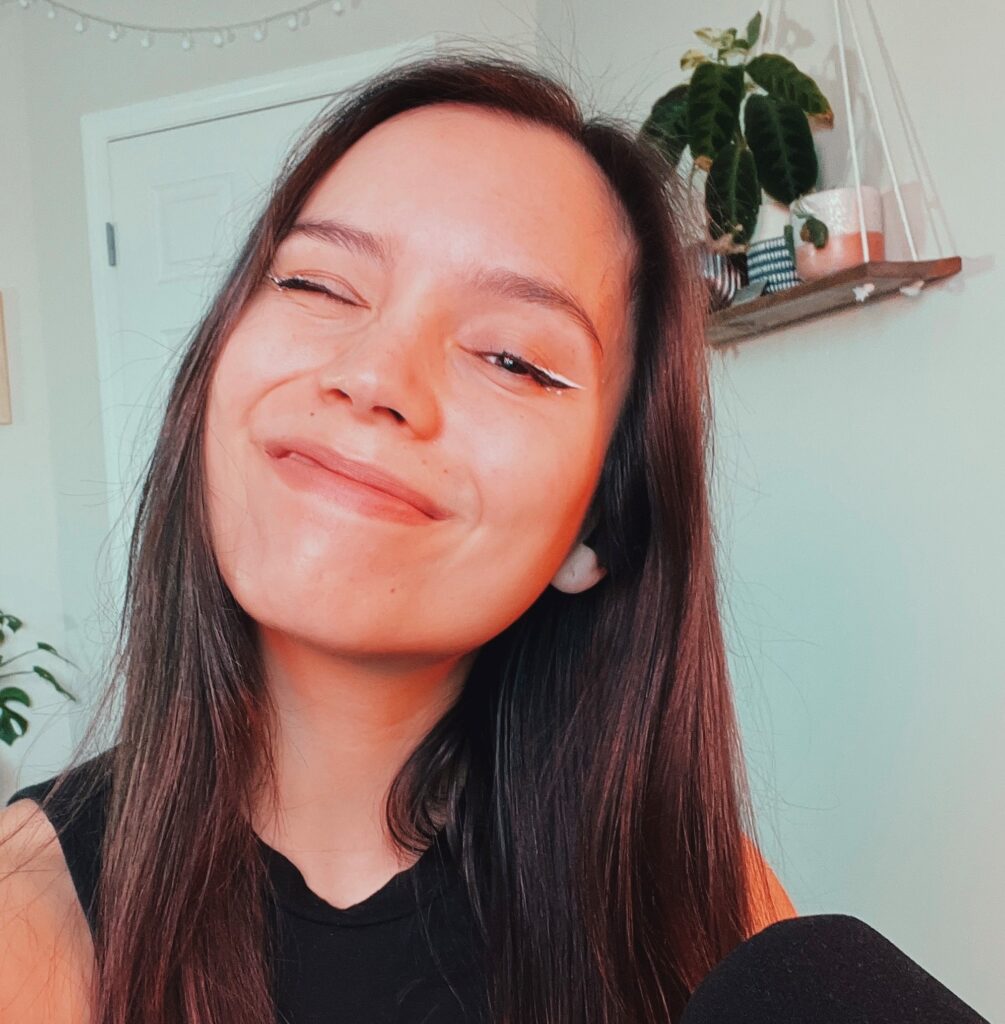
Now, I know as well as anyone that there can be a lot of stereotypes when we think about queerness in Alberta, stereotypes that often seem to focus on hardship and struggle. I’ve felt it in my own life, and I’ve heard it in the words of the people that I’ve interviewed, but today, I want to make room for the moments of queer joy that too often go unseen here. In sharing my story of growing up rurally and that of my friend, Alix Brett, my hope is that a larger audience can hear about some of the small victories that make me very proud to be Queer in Alberta.
As you’ll see in Alix’s story, some of us are queer and just so happen to love the pace of life in these little towns. I’ve lived on Treaty 7 territory in the city of Lethbridge for almost nine years now. During my first week of university, I remember looking out at the city lights on a late-night drive and just thinking to myself, wow. This new world around me is so much bigger than the one I came from! I grew up rurally in the Lakeland, a municipal district that’s three and a half hours northeast of Edmonton. I graduated in Bonnyville, Alberta, which was a 5,000-population town. If I were to sum up some of the hallmark aspects of growing up rurally, the first things that come to mind are drives to the next town over to go to Wal-Mart or the movies, and every major milestone event was celebrated at that same town’s BP’s (Boston Pizza).
It is a little strange for me to write about my experience of small-town queer life since a) it has been so long since I lived rurally and b) when I did, I was in deep denial about my sexuality. My parents never envisioned a future where their eldest and only daughter could be anything but straight and sex-ed in school only covered cisgendered heterosexual or hetero passing relationships. Anything that was “gay” felt socially and even morally taboo, and sadly, that meant this was a conversation that was heavily avoided. I did have one teacher in high school that was queer, but without understanding my own identity, I never reached out to her. As a result, until I turned 18 and moved to Lethbridge, queer people were simply moot– non existent, and when we did come up, we were portrayed as startling caricatures that were clearly influenced by damaging and outdated stereotypes. I do want to take a moment to acknowledge that while I had the opportunity to leave the small town that I grew up in, this is not the same story for all queer people in Alberta. Sometimes, people don’t want to leave the smaller communities that they’ve grown up in.
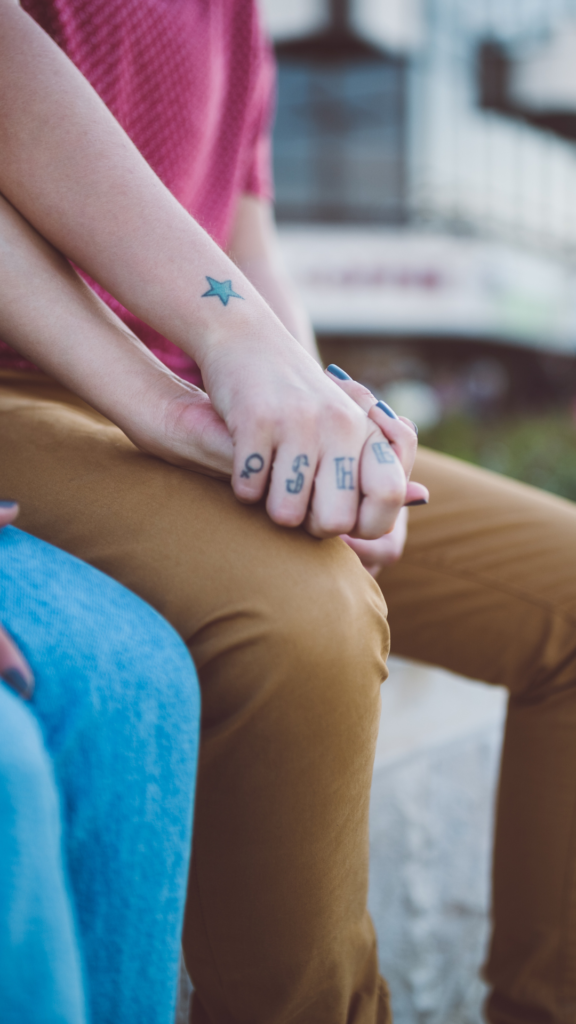

Alix and I met through Queer in Alberta. We both grew up rurally, but unlike me, Alix decided to stay in Stettler, a town roughly the same size as Bonnyville. The difference in Alix’s experiences, with mine, blew my mind and reminded me that just as I have changed and grown so much in the near decade since leaving, these small towns have had equal opportunity for growth. As an openly bisexual teacher, Alix was initially afraid to come out in the early stages of her career. After she did, she was surprised to find that her entire school staff was accepting and happy for her. Fellow teachers came to support her, even staff she didn’t usually talk too, and they were eager to ask her for resources on how they could be better educators for queer students.
With her grade ones, Alix thought that she would be the first person to introduce students to queer education and topics, whether it be through reading story books featuring two moms or talking about the different ways you can express yourself through gender. Yet again, she was surprised to find that through things like TikTok, kids are exposed to so much, leading them to see things that they might not in the small towns that they grow up in. This was especially striking to me because when I was growing up in Bonnyville, my world felt so small and finite. Through the advent of TikTok and the rise of social media, kids can access a much larger digital world around them. They can find representation, education, and tools that I never would’ve even dreamed of when I was in their shoes. By queering up her teaching style in the classroom, Alix quickly found that parents are beginning to have these conversations at home with their kids, something that would have been next to unheard of when I was growing up.
Since I’ve graduated, I’ve heard about other classmates of mine who moved away and came out like I did or about others who stuck around and were brave enough to do the same in that little town. Lakeland Pride has even begun to pick up steam and a friend of mine took some incredible pictures of the first pride flag raising last summer. These events and Alix’s story make me feel inspired to take up more space in a place that I never thought I would. Alix’s story proves that Alberta, while imperfect like any other place, has the capacity for openness, growth, and love. I don’t know that I would settle down somewhere as small as where I grew up, but I find that in this moment, I am grateful for the time that I spent in a small-town, and I am inspired by the bravery, resiliency, and triumphs of the members of our community who still do. If you are in a small town and feeling isolated, I want you to know that you are not alone. The world is growing and changing so quickly, and there are so many fantastic resources out there to support you wherever you may be. Through Queer in Alberta, I have heard stories about active GSA’s like the one Alix used to run at her school in Stettler, and I’ve learned about amazing organizations like Skipping Stone in Calgary, who provide gender affirming care and resources that you can access by visiting their website. Queer representation and support is out there, even if you might not feel like you see it in your day to day life.
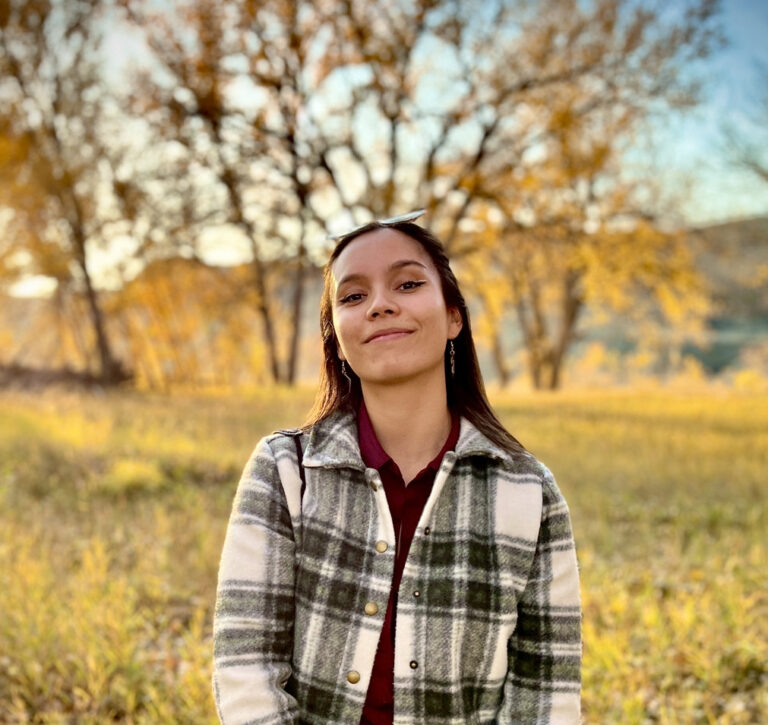
Kelsey Delamarter (she/her) is a mixed Pilipino-Canadian currently residing in Lethbridge, Alberta. She is the host and creator of Queer in Alberta and in fall 2022, Kels received the Telus Storyhive Vocies 2.0 grant to take the video podcast series to new heights on OptikTV in summer 2023. Outside of podcasting, she is currently working towards her Masters degree in Anthropology and working as a museum attendant at the Galt Museum & Archives – Akaisamitohkanao’pa in Lethbridge, Alberta. If you’d like to follow along with Queer in Alberta, you can listen to the podcast on Spotify, Apple Podcasts, Amazon, and Google, or you can watch online on YouTube. Additionally, Alix runs an amazing podcast called Small Town Not Small Minds with her friend Amy, also available on many of the same platforms.
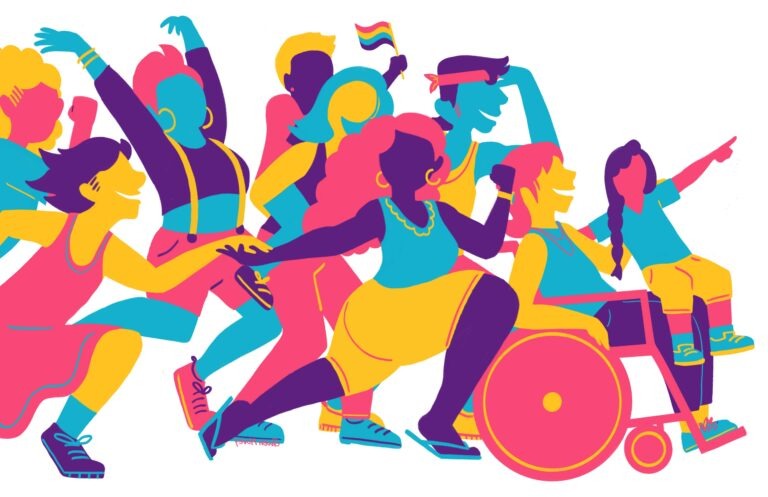
It Gets Better Canada is committed to connecting Canada’s 2SLGBTQ+ youth to a better future
Help us uplift, empower, and connect today’s youth across Canada today!
Your donation is eligible for a charitable tax receipt
Support the Movement

About the day The International Day Against Homophobia, Transphobia and Biphobia is observed annually on May 17th. This day was created to raise awareness and
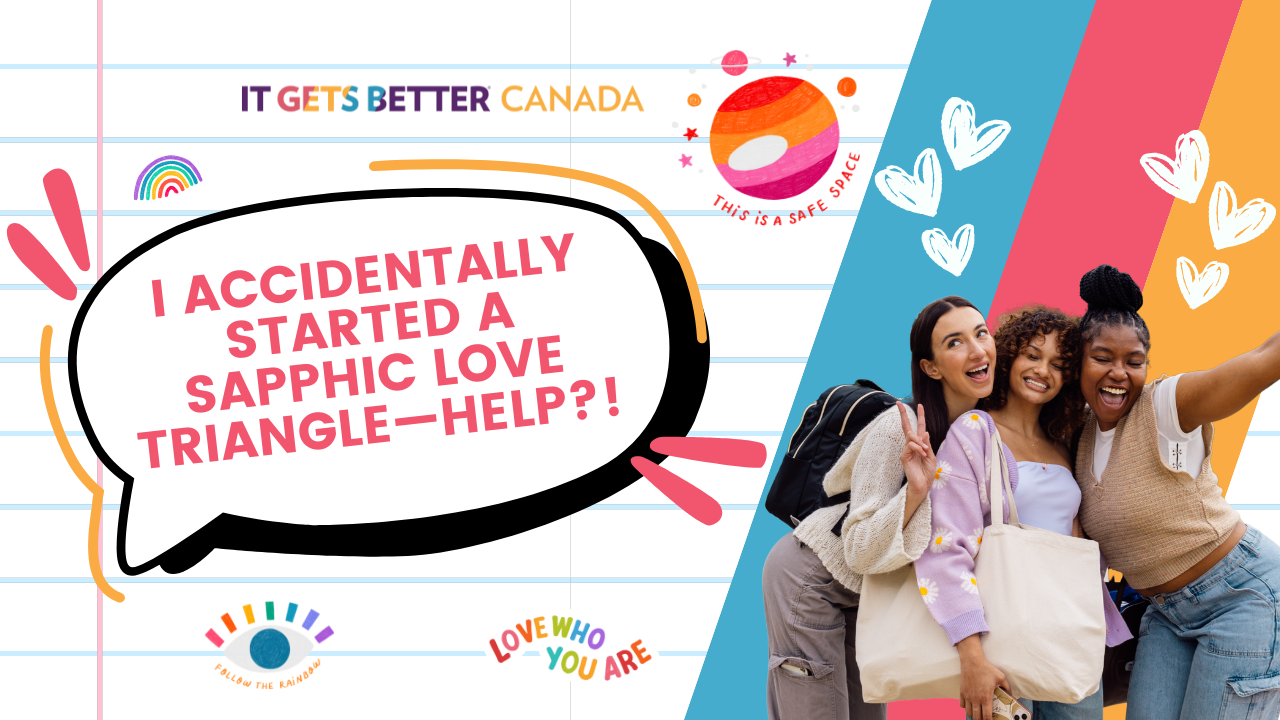
Dear Queer, So… I think I may have unknowingly written myself into the plot of a messy queer romance novel. I (24F) recently started casually
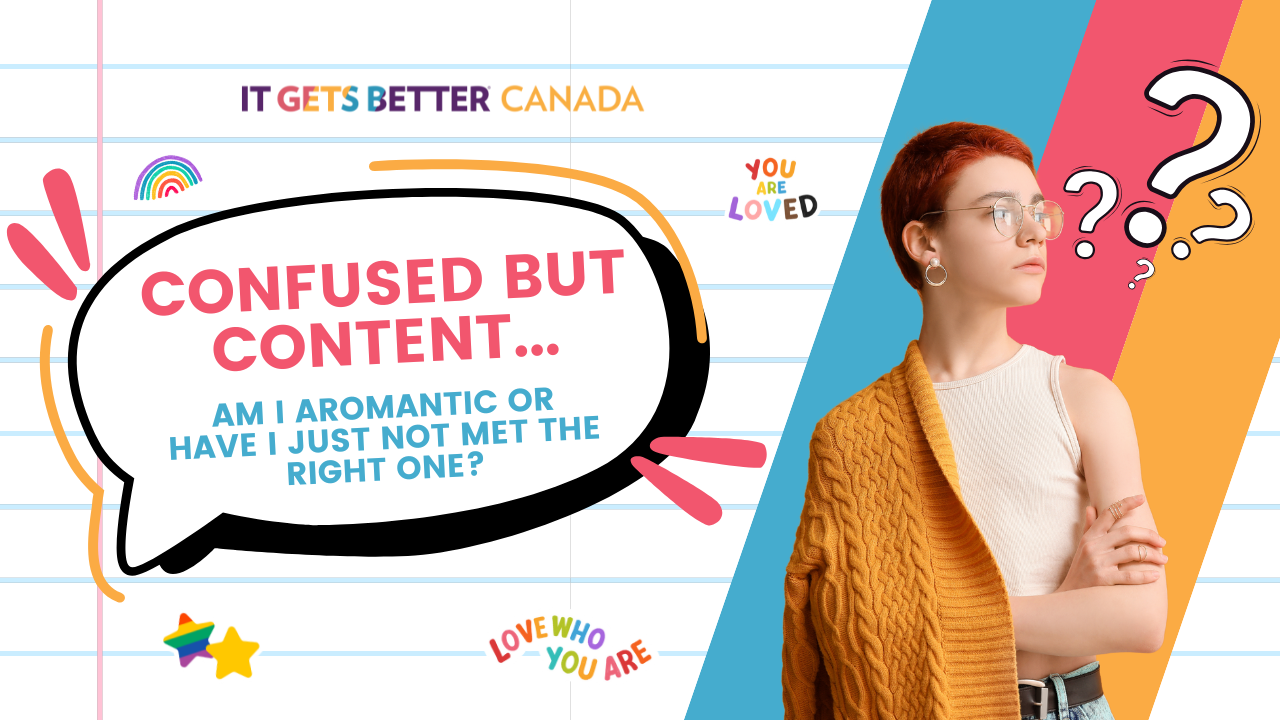
Dear Queer, Lately, I’ve been questioning my sexuality because I think I might be aromantic. I’ve never really felt romantic attraction, but I have deep,

It Gets Better Canada is proud to receive over $1.5 million in federal funding It Gets Better Canada is proud to announce that we have
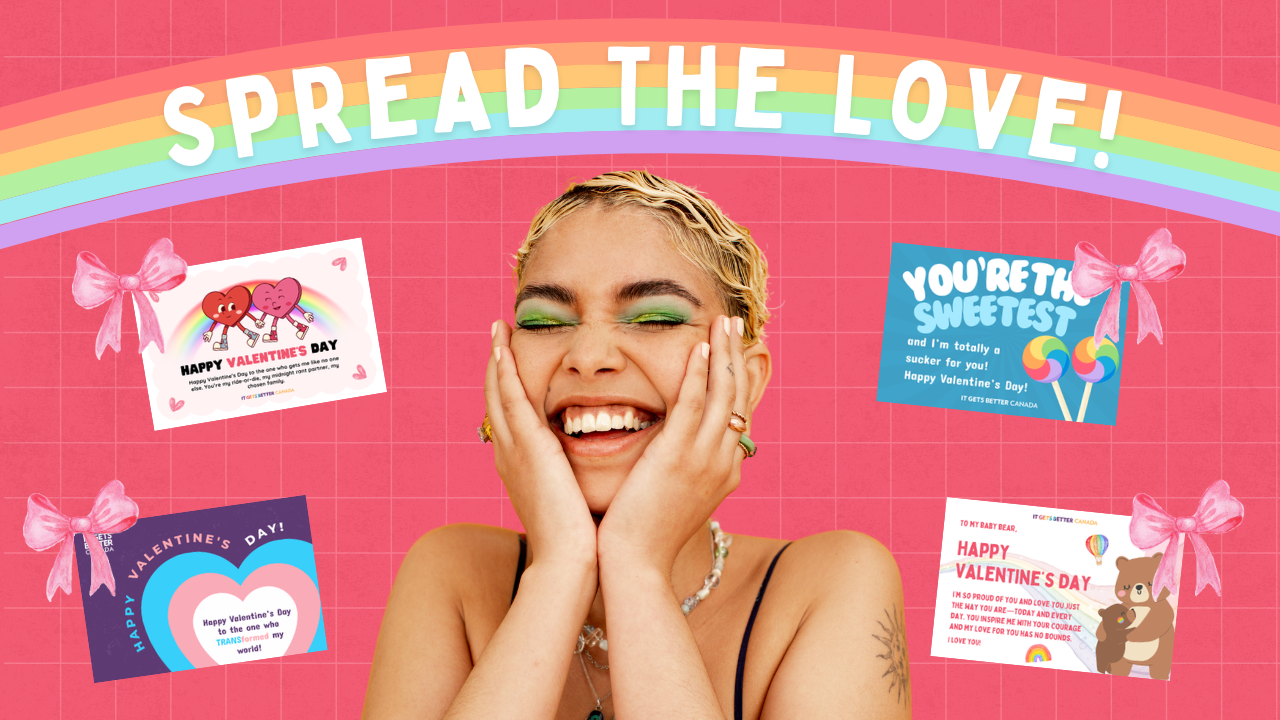
Send a thoughtful card to a loved one in the 2SLGBTQ+ community – whether it’s your partner, friend, or family member – and make a difference in our work for queer youth at the same time.

